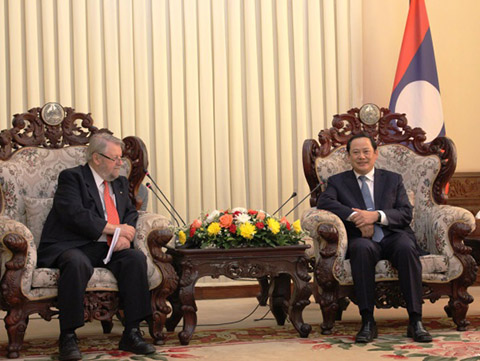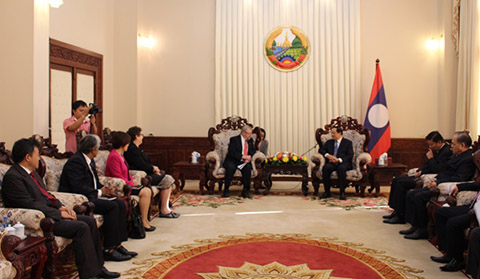The Lao People’s Democratic Republic conducted its first Joint External Evaluation (JEE) on health security with a multinational team of experts, and support from international agencies including the World Health Organization (WHO) and Food Agriculture Organization (FAO).
The Deputy Prime Minister, Mr Sonexay Siphandone met the international expert team led by Professor John Mackenzie and they were joined by the Deputy Minister of Health, Dr Phounthone Muongpak, WHO Director of Division of Health Security and Emergencies Dr Li Ailan and WHO Representative to Laos, Dr Juliet Fleischl.
Professor Mackenzie began by acknowledging the achievements of the country and thanked the country’s openness and transparency throughout the JEE process that has promoted the commitment of health and non-health sectors to improve health security and it has also enhanced national and international confidence in Lao PDR’s progress towards fulfilling its IHR (2005) core capacity requirements.
The core capacities of health security-related institutions in Laos have increased significantly in recent years. Annual reviews were conducted and major improvements were made in surveillance, risk assessment and response, laboratory capacity, and One Health coordination mechanism with functioning systems in all of these core capacities areas.
Six overarching recommendation includes revising the National work plan for Emerging Infectious Diseases (EIDs) and Public Health Emergencies (PHE) to take into consideration the recommended priority actions from this mission.
One of the key strategic priorities of WHO in-country is to prevent and control EIDs and PHE events by strengthening the capacity of government agencies for preparedness and response to health security risks following natural and man-made disasters.
Another recommendation focused on increasing and ensuring sustainable funding for health security, strengthening the health security workforce, and implementing functional measures for multiple sectors to collaborate, coordinate and communicate on preparedness and response to all PHE events.
The JEE team recommended regular review and formalizing draft laws, policies and Standard Operating Procedures (SOPs) related to health security with due consideration of international obligations, and fostering a culture of learning, review and continuous improvements in health security by conducting regular exercises and outbreak reviews.
The Ministry of Health with support from WHO will continue to provide support to strengthen the surveillance capacity at national and subnational levels for better prevention, detection, risk assessment and response through upgrading the scale and scope of systems.
It will also continue to enhance the capacity of laboratories to support surveillance and outbreak detection through improved diagnostic services and networking, including through continuation of the Lao Field Epidemiology Training Programme.
Mr Siphandone said “This JEE exercise is like a health check for the country, we will review and prioritize some of the recommendation that are in line with our 8th Social Economic Development Plan, SDGs and graduating from the Least Developed Country status by 2020. I would like the Ministry of Health to take the lead in strengthening capacity for health security and conduct joint exercises with other ministries like the Ministry of Defense to mitigate effects of national disaster that threaten health security.”


